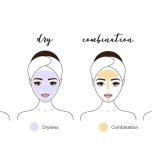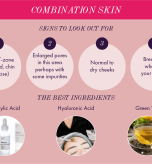Having healthy, glowing skin is a goal for many people, but the path to achieving it is not always straightforward. Skin comes in different types and requires specific care to thrive. Whether you have oily, dry, sensitive, or combination skin, understanding your skin type and choosing the right products is crucial for achieving your skincare goals. In this comprehensive guide, we will walk you through the various skin types and provide essential tips to help you maintain healthy skin.
Understanding Your Skin Type
One of the first steps in achieving healthy skin is understanding your skin type. Each type has its unique needs and challenges, and identifying your skin type will help you pick the right skincare products. Here are the most common skin types:
- Oily Skin
Oily skin is characterized by a shiny appearance, particularly in the T-zone (forehead, nose, and chin). People with oily skin tend to have enlarged pores and may be prone to acne and blackheads. Oily skin results from the overproduction of sebum (skin oil) that clogs pores. To manage oily skin, it’s essential to use products that balance oil production and prevent breakouts. - Dry Skin
Dry skin often feels tight and may have flakiness or redness. It can appear dull and may be prone to fine lines. Dry skin occurs when the skin lacks moisture, leading to a compromised skin barrier. To care for dry skin, it’s important to use hydrating and nourishing products that restore the skin’s moisture balance. - Combination Skin
Combination skin features both oily and dry areas. The T-zone is typically oily, while the cheeks may be dry or normal. Caring for combination skin can be challenging because it requires a balance of products that address both oil control and hydration. A customized skincare routine is key to maintaining balance. - Normal Skin
Normal skin is characterized by a balanced complexion, not too oily or dry. It has small pores and a smooth texture. While normal skin is relatively low-maintenance, it still benefits from regular moisturizing and protection from the sun’s harmful UV rays. - Sensitive Skin
Sensitive skin reacts easily to skincare products, weather changes, or environmental factors. It may become red, inflamed, or irritated. People with sensitive skin need to be careful when choosing products, opting for gentle and fragrance-free formulas to avoid flare-ups.
Essential Tips for Healthy Skin
No matter your skin type, a consistent skincare routine is crucial to achieving and maintaining healthy skin. Here are some universal tips that can benefit everyone:
- Cleansing
Cleansing your face twice a day—once in the morning and once before bed—is essential to remove dirt, oil, and impurities. Choose a gentle cleanser that suits your skin type. For oily skin, opt for a gel-based cleanser, while dry skin will benefit from a hydrating cream or milk-based cleanser. Always cleanse your face with lukewarm water, as hot water can strip the skin of essential oils. - Moisturizing
Moisturizing is crucial for maintaining healthy skin, regardless of your skin type. Even if you have oily skin, skipping moisturizer can lead to dehydration, causing your skin to overproduce oil. Choose a lightweight, non-comedogenic moisturizer for oily or acne-prone skin and a richer, more hydrating formula for dry skin. - Sunscreen
One of the most effective ways to protect your skin from premature aging and skin cancer is by wearing sunscreen daily. UV rays can cause fine lines, wrinkles, and sunspots, as well as increase your risk of skin cancer. Look for a broad-spectrum sunscreen with at least SPF 30 and apply it every morning, even if you’re staying indoors. - Diet
A healthy diet rich in vitamins, antioxidants, and healthy fats can benefit your skin. Foods high in vitamin C (such as citrus fruits), vitamin E (found in nuts and seeds), and omega-3 fatty acids (found in fish) help support skin health. Drinking plenty of water also ensures that your skin stays hydrated from within. - Sleep & Stress Management
Sleep and stress management are often overlooked but play a critical role in skin health. Lack of sleep can lead to dark circles, puffiness, and an uneven skin tone. High stress levels can trigger acne and exacerbate skin conditions like eczema and rosacea. Aim for at least 7-9 hours of quality sleep and practice stress-reducing techniques such as meditation, yoga, or deep breathing exercises.
Conclusion
Achieving healthy, glowing skin requires a deep understanding of your skin type and the right skincare routine. By following these tips—proper cleansing, moisturizing, using sunscreen, eating a balanced diet, and managing sleep and stress—you can maintain beautiful skin for years to come. Remember, consistency is key, and taking care of your skin today will pay off in the future.
 English
English 



